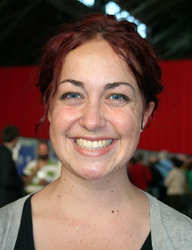EPOXI
Two intriguing investigations -- One flight-proven spacecraft
Sarah Ballard
Sarah Ballard
Graduate student, research assistant, Harvard

What's the coolest thing about EPOXI?
The possibility of detecting an Earth-sized planet around another star! I am also really excited about EPOXI's ability to search for rings and moons around planets outside our solar system.
Why do you like working at Harvard?
Harvard is a great place to be a graduate student- it's a very welcoming community for us. Boston is also a wonderful place to live.
What is your job on the EPOXI mission?
I am a graduate student working on making the data we receive from the spacecraft (thousands and thousands of pictures from EPOXI just staring at a star for several weeks) into usable information, like how the star's brightness changes with time. If it gets dimmer unexpectedly, that could mean a planet is crossing the face of the star- and I am also working on detecting planets that way, even as small as Earths for some of the EPOXI targets.
How did you end up in Space Science?
I took an astronomy class when I was a freshman in college, which at the time I wasn't very happy about doing. My college had a requirement that everyone had to take at least one physical science class, so I picked astronomy to fulfill mine. Then one day, the professor put up a slide of an astronomical picture- to me, it looked like two cotton balls next to each other, one larger than the other- and he asked the class, "what do you think this is a picture of?" I was half-asleep, because the class was at 9 AM, but I thought maybe it was a couple of stars. He said, "this is two galaxies- each of them contains billions of stars, and the smaller one is orbiting the larger one." I had one of the singularly most transformative experiences of my life then- it registered how immense the things were that I was seeing in that picture, how each of them was composed of stars separated by distances I couldn't begin to imagine. And yet, the laws of gravity applied even on that scale- just as the moon goes around the Earth and the Earth goes around the Sun, galaxies orbit each other. My mouth dropped open. It was the experience that made me want to become a scientist.
What do you do in your spare time?
I love traveling and I love photography. I also read fiction all the time. I like to just hang around with friends and talk, too!
Who in your life inspired you?
I have a lot of wonderful, supportive people in my life, but my dad is an inspiration to me. He showed me, by example, that you can achieve your dreams in life through hard work. I used to think a lot of the time, when I was in college, that there was some kind of "brick wall" that existed in science and math, and when I hit that wall, there was no amount of work that I could do that would allow me to understand the material. That just isn't true. You can always work harder and understand. There were a few times I called my dad to hear him say that to me. My grandmother is also an inspiration to me, because of how much she's experienced and seen, though she grew up on a ranch in rural Montana. I think she inspires me because of how gracefully she acknowledges everything that's happened in her life, and she's had such a full one. I want to live that way, too.
What is one yet-to-be achieved life goal?
I would love to see a solar eclipse someday. But I don't know that I have a single life goal that sticks out- I have an idea of the type of person and scientist I want to become someday, but I think that's something that will happen progressively over time, and not all at once.
Were you science-oriented as a young person?
Not really. I loved reading fiction when I was a kid, and English was often my favorite class in high school. Math and science were engaging to me then, but I wouldn't say I loved them.
What was your favorite book as a young person?
I loved the Wizard of Oz books- they are actually a series!! I read them all, one after another.
What did you want to become when you were young?
There was a while when I wanted to be an oceanographer- taking underwater pictures. Everything in my childhood bedroom was fish-themed.
If you weren't working in space exploration now, what might you be doing?
I think I would have stayed with my first concentration in college, which was Peace and Conflict Studies. Maybe I'd be working on public policy instead. The issues are still very close to my heart!
